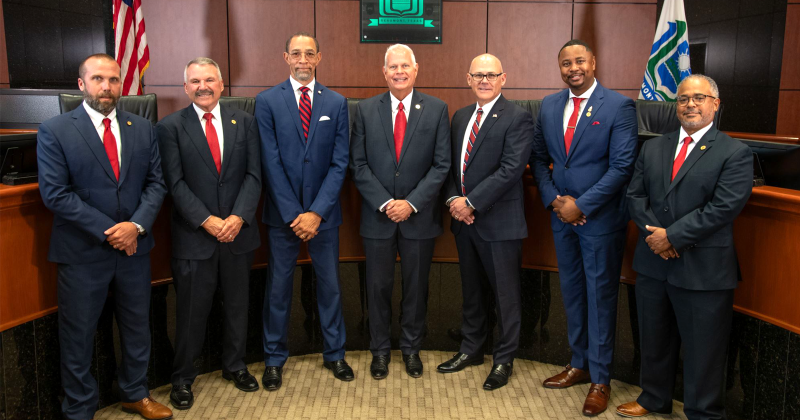Beaumont residents are facing a pivotal decision as they head to the polls in the current election to determine whether significant changes are made to the city’s charter, which is functionally the constitution of a city. The process to initiate these changes began in April when the city council approved the formation of the Charter Review Committee.
According to city officials, the creation of the Charter Review Committee “was designed to ensure compliance with state law and address any issues of ambiguity within the city charter.” It also sought to “facilitate community participation throughout the revision process.” The committee was to consist of 11 community members, with the mayor and council members each appointing one member added to the city manager and city attorney serving as ex officio members.
The committee included the appointment of eight individuals at the April 25 City Council meeting, including Carolyn Guidry, Francis Sam, Lashon Proctor as Vice Chairman, Robin Troy, Cory Crenshaw as Chairman, Roy Steinhagen, Melanie Samuel, and Jesus Abrego. Later named individuals have included recent West Brook grad Sam Marchand, former Port Arthur City Manager Brian McDougal, Shirlene Cook, Robert Calvert and Daylyn Turner.
Between May and July, the Charter Review Committee reportedly convened a total of five times to discuss and propose changes to the city charter, according to Austin attorney Charles Zech, who assisted the committee with legal advice during the process. After months and months of work, the Charter Review Committee whittled the proposals to matters to be presented to voters.
Zech additionally assisted in explaining the recommendations on behalf of the committee during the Aug. 1 city council meeting, in which he explained the Proposition A recommendation would change terms from two to four years on staggered terms, and council members at-large would be elected by place. The original recommendation for Proposition B was a term limit provision with a required single-term sit-out after serving a maximum of eight consecutive years. But, should a councilmember decide to run for mayor immediately following their term limit as councilperson, they would be eligible to serve the full maximum of eight years as mayor prior to being required to sit-out a single term.
However, when the city council voted on the finalized version on the charter ballot, the Charter Review Committee’s recommendations were modified to read: City of Beaumont Proposition A: Shall the City Charter of the city of Beaumont be amended to increase City Council terms from two (2) years to four (4) year staggered terms with a three-term limit totaling twelve (12) years per office?
Currently, city council terms are set to two years without a term limit and Councilmember Ward III Audwin Samuel is the longest-standing elected public servant, having served 24 consecutive years and a total of 33 years on behalf of Ward III. Should voters decide to put term limits into place, they will not be retroactive, and each council member would be eligible for a new 12-year limit.
The difference in the Charter Review Committee’s suggestion versus the language on the ballot allows for a three-term limit totaling 12 years as opposed to the committee’s two-term limit totaling eight years and combined the originally separated propositions A (to extend terms) and B (to recommend term limits). A total of five propositions are on the city ballot. In addition to Proposition A, voters are asked:
Proposition B: Shall the City Charter of the city of Beaumont be amended to require the city council to hold such regular meetings as necessary to efficiently conduct the affairs of the City?
Proposition C: Shall the City Charter of the city of Beaumont be amended to clarify the authority of the city manager and city council’s role?
Proposition D: Shall the City Charter of the city of Beaumont be amended for consistency and compliance with State Law?
Proposition E: Shall the City Charter for the city of Beaumont be amended to delete repetitive and unnecessary provisions?
Texas school districts do not receive state funding for renovating or building new schools. Instead, they must receive funds through school bond elections.
Orangefield ISD voters will decide on a $42.9 million bond election to address safety and security upgrades, renovations/additions, and upgrades to aging facilities.
In Silsbee ISD, voters will decide on a $84.5 million bond referendum that includes a new middle school, a high school career and technical building, agricultural barn, renovations and other proposed projects.
Sabine Pass ISD residents will vote on an ad valorem tax rate of $1.05135 per $100 of the taxable assessed valuation of property for the current year. The proposed rate will result in an increase of 4.48% ($0.76800 per $100 valuation) in maintenance and operations tax revenue for the school district for the current year as compared to the preceding year, which is an additional $681,590.
Also, Port Neches-Groves ISD residents will vote on candidates for the Board of Trustees Place 6 (newcomers Brenda Duhon or Melanie Plaia Miller) and 7 (incumbent Jake Left and Jordyn Collide) seats.
In addition to varied bond elections and city matters proposed throughout the Golden Triangle, the Texas Constitutional Amendment election ballot asks for:
Proposition 1: Establishing a right to farming, ranching, timber production, horticulture, and wildlife management on owned or leased personal property.
Proposition 2: Allowing local governments to exempt childcare facilities from property taxes.
Proposition 3: Prohibiting the imposition of an individual wealth or net worth tax on individuals or families.
Proposition 4: Increasing the homestead tax exemption by a school district to $100,000 and increasing state funding for public education.
Proposition 5: Renaming State University Research Fund from National Research University Fund and establishing an ongoing revenue source from the accrued interest of the Economic Stabilization Fund (the Rainy Day Fund).
Proposition 6: Creating the Texas water fund to assist in financing water projects in this state.
Proposition 7: Creating the Texas Energy Fund to support the construction, maintenance, modernization, and operation of electric generating facilities.
Proposition 8: Creating the Texas Broadband Infrastructure Fund to expand high-speed broadband access and assist in the financing of connectivity projects.
Proposition 9: Authorizing the state legislature to provide a cost-of-living adjustment to eligible annuitants of the Teacher Retirement System of Texas.
Proposition 10: Authorizing the state legislature to exempt from ad valorem taxation tangible personal property manufactured by medical or biomedical companies.
Proposition 11: Authorizing the legislature to permit conservation and reclamation districts in El Paso County to issue bonds supported by ad valorem taxes to fund the development and maintenance of parks and recreational facilities.
Proposition 12: Providing for the abolition of the office of county treasurer in Galveston County.
Proposition 13: Increasing the mandatory retirement age for state judges and justices from 75 to 79 and the minimum retirement age to 75 years, up from 70.
Proposition 14: Providing for the creation of the centennial parks conservation fund to be used for the creation and improvement of state parks.
Early voting began Oct. 23 and will end Nov. 3 with election day scheduled for Tuesday, Nov. 7.


